Sur la profanation d’une quarantaine d’écrans publicitaires à bruxelles
Catégorie :
Thèmes :
Lieux :
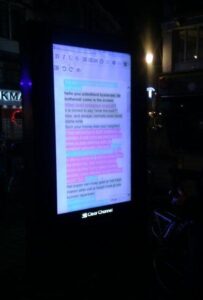
Avec une haine mal dissimulée, nous nous sommes habitués à l’apparition de toutes sortes d’appareils publicitaires dans les rues de nos villes, en essayant d’ignorer leur présence, leur éclat se jette sur nous alors que nous essayons d’échapper à leur demande d’attention. Nous avons appris à limiter leur impact toxique sur notre propre perception individuelle, à filtrer le langage de manipulation qu’ils utilisent pour seduire les gens de consommer.
Néanmoins, leurs mécanismes malades nous affectent tous, ils affectent nos villes et ils affectent nos vies ; la publicité est l’un des principaux piliers de le capitalisme de platforme, qui alimentant les empires de google, de facebook et toutes les autres entreprises de médias sociaux.
Bien entendu, leur nocivité en tant que force globale va de pair avec leur toxicité individuelle. La publicité étudie et exploite les comportements et les faiblesses de ses « cibles » potentielles, en se nourrissant et en contribuant à d’autres structures merdiques de la société, du renforcement de l’oppression systématique et du sexisme à l’exploitation des addictions, des obsessions et des traumatismes, le tout au nom du profit.
Ce cocktail de violence visuelle atteint aujourd’hui un nouveau niveau d’intensité, les écrans éclairés occupant de plus en plus d’espace dans la ville. Avec leurs méthodes sournoises, le duo-poly de ClearChannel et JCDecaux a facilement convaincu les responsables politiques de la ville de leur permettre de vomir toute l’industrie pourrie de la publicité devant des millions d’habitants chaque jour, en échange d’un abribus « gratuit » ou d’un point de location de vélos.
La publicité défini comme « digital out of home (DOOH) » amène des ordinateurs dans tous les coins de nos rues afin qu’ils puissent participer au virage général vers la surveillance commerciale, ce qu’ils appellent « smart-city ».
Alors quelques caméras internes des écrans ont dû être retirées. Ils envisagent maintenant d’inclure un système pour suivre les smartphones des passants, pour étudier leurs comportements autour des écrans et leur filer des publicités ciblées. Les écrans publicitaires deviennent littéralement la façade d’un réseau de données et d’argent qui circule dans les poches et les désirs.
Il est désormais impossible de les ignorer. Contre cette occupation militaire de nos espaces visuels et imaginaires, une action a été menée mercredi dernier dans l’après-midi, au cours de laquelle 45 des écrans ClearChannel ont été subvertis, leur stock d’images envoyé en arrière-plan jusqu’à l’intervention de l’entreprise le lendemain.
Les auteurs ont décidé de ne pas imiter le langage de la publicité et, au lieu d’échanger leurs propres cris contre ceux des annonceurs, ils ont transformé ces écrans en surfaces d’écriture collaborative (etherpad). Sur chaque de ces surface d’écriture, les différents participants et passants ont pu jusqu’à la nuit, laisser un texte sur les écrans pour que d’autres puissent le lire (ou l’ignorer !), et brouiller le texte des autres. Plusieurs personnes se sont jointes à la réappropriation festive de ces portions d’espace public occupées, en jouant avec les écrits, en se répondant avec des segments de texte, en écrivant des slogans et des citations.
Cette action joyeuse nous rappelle que nous pouvons toujours prendre des initiatives contre les infrastructures de l’oppression qui semblent parfois intouchables et hors de portée. Et que dans chaque dispositif black-box se trouve un ordinateur qui peut être profané, dont le fonctionnement normal suspendu et ses interconnexions converties pour étendre son inopérabilité aux autres nœuds du réseau. Et aussi, que notre imagination peut percer et aller contre le présent dans lequel nous vivons et le futur qu’ils construisent dessus.
… Language !It’s a virus !
Language ! It’s a virus !
Language ! It’s a virus !
– – – – – – – – – – – – – – – – – – – – – – – – – – – – – – – – – – – – – – – – – – – – – – – – – – – – – – – – – – – – – – – – – – – – – – – – – – – – – – – – – – – – – – – – – – – – – – – – – – – You know ? I don’t believe there’s such
A thing as TV. I mean –
They just keep showing you
The same pictures over and over
… Laurie Anderson – Language Is A Virus (From Outer Space)
—
On December 16th, in the late afternoon, around forty advertisement screens in the streets of Brussels stopped inciting consumption ; the devices were hacked. The streets of the city were lit by a different light.
— With ill-concealed hate we got used to the appearance of all kinds of advertisement apparatuses in our cities streets, trying to ignore their presence, their shine pushing in on us as we try to evade their demand for attention. We learned to limit their toxic impact on our own individual perception, to filter out the language of manipulation they use for convincing people to consume. Still, their sick mechanisms affect us all, they affect our cities and they effect our lives ; advertising is one of the main pillars of platform capitalism, fueling the empires of google, facebook and all other social media companies.
Needless to say, their harmfulness as a global force goes hand in hand with individual toxicity. Advertising studies and exploits the behaviors and weaknesses of their potential ’targets’, feeding on and contributing to other fucked up structures of society, from reinforcing systematic oppression and sexism, to exploiting addictions, obsessions and traumas, all in the name of profit.
This package of visual violence is nowadays brought to a new level of intensity, with lit up screens occupying more and more space in the city. With their sneaky ways the duo-poly of ClearChannel and JCDecaux has easily convinced city politicians to vomit the whole rotten advertisement industry in the face of millions of inhabitants everyday, in exchange for a « free » abribus or a bike rental hub. The so-called « digital out of home (DOOH) » advertisement brings computers in all corners of our streets so that they can partake in the general turn to commercial surveillance, what they call « smart-city ». While the internal cameras of the screens had to be removed, they are now planning to include a system to track the smartphones of passersby, to study their behaviors around the screens and deliver them targeted advertisements. Advertisement screens literally become a facade to a network of data and money running through pockets and desires.
We cannot ignore them anymore. Against this military occupation of our visual and imaginational spaces, an action has been carried on last wednesday afternoon, during which 45 of these screens were subverted, their stock of imagery sent to background until the intervention of the company the day after.
The perpetrators decided not to mimic the language of advertising and instead of exchanging their own shouts for the ones of the advertisers, they turned these screens into writing surfaces. Opening a series of collaborative writing pages (etherpad) on each of them, different participants and passersby were able until the night to leave something on the screens for others to read (or ignore !), and to mess with each other’s text. Different people joined the festive reappropriation of these occupied parts of public space, playing with writing, responding to each other segments of text, writing slogans and quotes.
This joyful action wants to be a reminder that we can take steps against the infrastructures of oppression that seem at times untouchable and out of reach. That inside every black-box dispositive there is a computer that can be profaned, its normal way of functioning suspended, its inter-connection converted to spread inoperativity to the other nodes of the network. That our imagination can pierce through and go against the present in which we live and the future they construct on it.
…
Language ! It’s a virus !
Language ! It’s a virus !
Language ! It’s a virus !

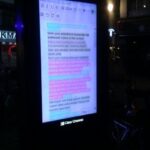

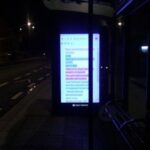
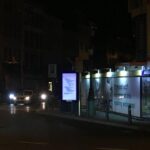
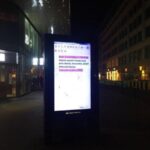
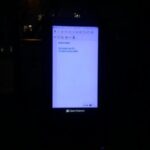
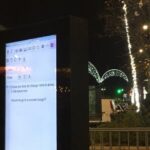
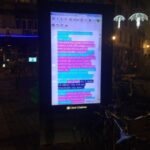
Commentaires
Les commentaires sont modérés a priori.Laisser un commentaire